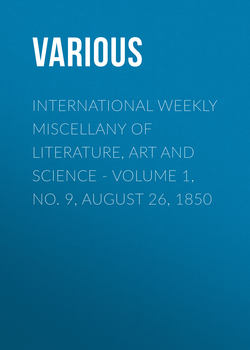Читать книгу International Weekly Miscellany of Literature, Art and Science - Volume 1, No. 9, August 26, 1850 - Various - Страница 5
THE DECAY OF GREAT FAMILIES
ОглавлениеNot the least valuable parts of Burke's just published "Anecdotes of the Aristocracy," are a species of essay on the fortunes of families. The following is from a chapter on their decadence:
"It has often occurred to us that a very interesting paper might be written on the rise and fall of English families. Truly does Dr. Borlase remark that 'the most lasting houses have only their seasons, more or less, of a certain constitutional strength. They have their spring and summer sunshine glare, their wane, decline, and death.' Take, for example, the Plantagenets, the Staffords, and the Nevills, the three most illustrious names on the roll of England's nobility. What race in Europe surpassed in royal position, in personal achievement, our Henries and our Edwards? and yet we find the great-great-grandson of Margaret Plantagenet, daughter and heiress of George Duke of Clarence, following the craft of a cobbler at the little town of Newport in Shropshire, in the year 1637. Beside, if we were to investigate the fortunes of many of the inheritors of the royal arms, it would soon be discovered that
'The aspiring blood of Lancaster'
had sunk into the ground. The princely stream at the present time flows through very humble veins. Among the lineal descendants of Edmund of Woodstock, Earl of Kent, sixth son of Edward I., King of England, entitled to quarter the Royal arms, occur Mr. Joseph Smart, of Hales Owen, butcher, and Mr. George Wilmot, keeper of the turnpike-gate at Cooper's Bank, near Dudley; and among the descendants of Thomas Plantagenet, Duke of Gloucester, fifth son of Edward III., we may mention Mr. Stephen James Penny, the late sexton at St. George's, Hanover Square.
"The story of the Gargraves is a melancholy chapter in the romance of real life. For full two centuries, or more, scarcely a family in Yorkshire enjoyed a higher position. Its chiefs earned distinction in peace and war; one died in France, Master of the Ordnance to King Henry V.; another, a soldier, too, fell with Salisbury, at the siege of Orleans; and a third filled the Speaker's chair of the House of Commons. What an awful contrast to this fair picture does the sequel offer. Thomas Gargrave, the Speaker's eldest son, was hung at York, for murder; and his half-brother, Sir Richard, endured a fate only less miserable. The splendid estate he inherited he wasted by the most wanton extravagance, and at length reduced himself to abject want. 'His excesses,' says Mr. Hunter, in his 'History of Doncaster,' 'are still, at the expiration of two centuries, the subject of village tradition; and his attachment to gaming is commemorated in an old painting, long preserved in the neighboring mansion of Badsworth, in which he is represented as playing at the old game of put, the right hand against the left, for the stake of a cup of ale.
"The close of Sir Richard's story is as lamentable as its course. An utter bankrupt in means and reputation, he is stated to have been reduced to travel with the pack-horses to London, and was at last found dead in an old hostelry! He had married Catherine, sister of Lord Danvers, and by her left three daughters. Of the descendants of his brothers few particulars can be ascertained. Not many years since, a Mr. Gargrave, believed to be one of them, filled the mean employment of parish-clerk of Kippax.
"A similar melancholy narrative applies to another great Yorkshire house. Sir William Reresby, Bart., son and heir of the celebrated author, succeeded, at the death of his father, in 1689, to the beautiful estate of Thrybergh, in Yorkshire, where his ancestors had been seated uninterruptedly from the time of the Conquest; and he lived to see himself denuded of every acre of his broad lands. Le Neve states, in his MSS. preserved in the Heralds' College, that he became a tapster in the King's Bench Prison, and was tried and imprisoned for cheating in 1711. He was alive in 1727, when Wootton's account of the Baronets was published. In that work he is said to be reduced to a low condition. At length he died in great obscurity, a melancholy instance how low pursuits and base pleasures may sully the noblest name, and waste an estate gathered with labor and preserved by the care of a race of distinguished progenitors. Gaming was amongst Sir William's follies—particularly that lowest specimen of the folly, the fights of game-cocks. The tradition at Thrybergh is (for his name is not quite forgotten) that the fine estate of Dennaby was staked and lost on a single main. Sir William Reresby was not the only baronet who disgraced his order at that period. In 1722, Sir Charles Burton was tried at the Old Bailey for stealing a seal; pleaded poverty, but was found guilty, and sentenced to transportation; which sentence was afterward commuted for a milder punishment."
